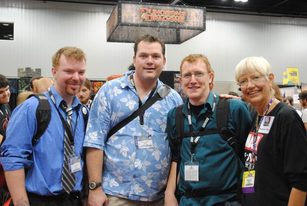 Size totally does matter! Not that way. Get your minds out of the gutter. This week, we tackled the conundrum of "just how many players does it take to run a game?". Not as easy a question as you'd think. When it comes to getting the proportions right, DCR says: 1. Balance. The scope and magnitude of your adventures should be proportionate to the size of the group. Don't make the mistake of coming up with an epic-sized adventure before you find out that only three players will be attending. Sort out exactly how many will be playing before you lay the ground work for the stories. Small groups can be overwhelmed by the scope of the events unfolding around them. Likewise, large groups can be bored to tears if the scope is too small. Also, especially for smaller groups of 2 to 4, focus your storytelling on the character and how the develop over the long term rather than a string of events climaxing in a grand battle. On the other end of the spectrum: players, don't worry about whether or not your party has a "healer" or "tank" until after the players have been established. The idea is to not limit your choices. But truly, a party can be comprised of any mixture of archetypes and be successful so long as your DM/GM/storyteller/referee/whatever can manage who is doing what in the group. Fights are always exciting when driving a story forward. 2. Groups can be rather large, but we say six to eight people is pretty darn large for a group. Any more than that, and you risk losing players' agendas in the mix. Nobody likes putting effort into creating a fun backstory and then it gets ignored. BOO FOR THAT! If whomever is running your game is comfortable with ten or more, then who are we to argue. But just because you know 20 gamers, doesn't mean you have to have 20 people in your game. Factor in you preferred mode of storytelling when deciding who to invite. Remember players: you are not obligated to participate in a game if you feel uncomfortable with the number of players. Exercise your freedom if you don't want to be in a large group. Gaming is not a chore, nor is it an iron-clad commitment. It is just a game. 3. When running for four or more people, keep in mind that more doesn't necessarily mean merrier. Whatever happens, keep the action moving! Experienced players should be leading by example and know what spells they have at the ready and what sorts of abilities they have at their disposal so that when prompted, they can resolve their attacks or actions quickly and efficiently. Experienced players who are indecisive or constantly look up stats or abilities in books, or in other ways stall the action should be passed over and allowed to resolve their actions at a later time. Adventure waits for no adventurer! We're pretty sure that Sauron didn't wait for Frodo and company to look up what they wanted to multiclass into when they gained enough XP. Bonus XP: For even the smallest groups, splitting thing up to keep the plot moving is perfectly acceptable. Safety isn't always in numbers. Proper teamwork can overcome almost any problem. This also promotes inter-party relations and builds a higher sense of cohesion. Even the most epic characters in literature aren't powerful because of how many attacks they have. They become epic because of what they learn from the people they know. In the end, it doesn't matter how many players are participating, just that they are participating and having fun; the ultimate goal of any good game.
1 Comment
Gamer Forge Listener Email:
Name: Axel the Mouth Comments: Gentlemen, I want to try my hand at playing an evil character in the game I am playing in. How can I play such a character in a group that is mainly good & Neutral character without being killed by the group. Axel Gamer Forge Response: It's sometimes soooo good to be bad! When you're the only one playing the opposite side of the coin, DCR says: 1. Bribery is the easiest way. It's not much of a stretch to imagine that most characters can be bought off to ignore your smaller indiscretions. Send a little coin to your less-than-reputable allies, or give them some of the magic loot in return for looking the other way. While this isn't a foolproof solution, it is one to keep in mind at all times. Bribery can get you out of the small jams when you're about to be discovered. That being said, don't rely on it as your sole method of subtlety. Evil in the midst of good has to work in baby steps as to not draw attention. But more on that, later. 2. Use 'em! Convince others to do your bidding, and everything should be your bidding. This is where the evil character needs to start weighing the decision "Intent vs. action". What's more important, the spreading of your evil, or that you are the one doing the spreading? Some players are more hands-on, and that's totally okay. But this will be a constant struggle. Also, just because you're evil, doesn't mean you're a maniac. Not every action you take has to be something horrible or treacherous. Subtlety can be established by making your evil look like a freak, one-time event. Which leads us to... 3. Always, always, always have a good reason. "The Operative" in the movie Serenity believed that it was absolutely okay to kill children to achieve a better life for everyone. Believed. He believed it was necessary for something that he couldn't even partake in. But he could absolutely justify any atrocity with his belief. It's a bit radical for some players to take a hard line like this, but you are the one who wanted to be evil, thus, this is the consequence of being evil. Going back to the choice of "intent vs. action", remember you won't be getting much evil done if everybody who knows you believes you're evil. The trick isn't to convince the good people that you're not bad. The trick is to convince the good people that whatever you do is right, and they should be okay with letting you do it. *Bonus XP: This one should be a gimme, but for a great, entertaining example of warping good intentions with evil actions, watch the television show Dexter. A fine example of justification. A villain who just does evil things for no reason gets boring pretty quick. It's funny to make a character do something treacherous to add some spice to the story, but remember that actions carry consequences. One act of evil can snowball into something completely unintended for your character. One evil begets another evil, and so on... |
The GamerForge is DungeonCrawlersRadio’s most favoritist segment of the entire show. Have you ever had a boggling rules question that no one in the group can figure out? Write in to us and we’ll help try to solve it! Are you a Game/Dungeon Master who needs help squashing animosity at the table or dissension in the ranks? Perhaps we can help!
If you are in need of help, encouragement, or an uber devious way to get a TPK, we are here to help. No matter your needs, we’ll help you get more from your gaming! The Gamer ForgeWhere Players & Game Masters can come for valuable information to level up your game! Archives
August 2013
Categories
All
|
 RSS Feed
RSS Feed








